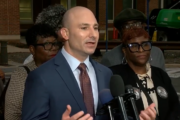Financial abuse is a subtle but common form of abuse that can occur in marriages and relationships.
Deborah J. Vagins, president and chief executive office of the National Network to End Domestic Violence, points to a University of Wisconsin–Madison 2011 study as evidence of the pervasiveness of financial abuse in the home.
“There is research that indicates that financial abuse occurs in 99% of domestic violence cases,” she says. “There are also surveys of survivors that reflect concern over their ability to provide financially for themselves and for their children.”
[See: Fast Financial Fixes.]
Here’s what experts say about how financial abuse is defined and the signs of financial abuse in a marriage or relationship you should watch for.
What is Financial Abuse?
Financial exploitation occurs when an abuser gains power and control in a relationship by restricting a victim’s access to money.
“[Victims] can get further trapped in these abusive relationships when their financial choices are fewer,” Vagins says. “It diminishes their ability to leave and stay safe.”
Financial abuse might seem less common than other types of abuse, such as domestic or sexual abuse, but it’s actually very common in domestic violence situations, according to Vagins.
“It’s one of the most common and powerful methods of keeping a survivor trapped in an abusive relationship,” she says.
What are the Signs of Financial Abuse?
An abuser may use a number of methods to keep a victim trapped in a marriage or relationship with seemingly no way out. Sometimes these tactics are hard to spot right away, especially because financial abuse isn’t as overt as other types of abuse.
“Financial abuse can begin subtly and progress over time,” Vagins says.
In financially abusive relationships, a victim might be fearful about sharing his or her opinion in financial matters or expressing his or her wants or needs.
Here are 8 signs of financial abuse, according to Vagins:
— Running up large amounts of debt on joint accounts.
— Refusing to pay bills on an account in the victim’s name.
— Ruining a victim’s credit score.
— Controlling how all of the money is spent.
— Limiting (and diminishing) a victim’s access to bank accounts.
— Giving an allowance that is diminished over time.
— Hiding assets.
— Withholding funds for the family’s or children’s basic needs.
Another common tactic financial abusers use to keep victims trapped in a relationship is to limit their employment potential by, for example, forcing them to miss work or even harassing them while they are at work to jeopardize their employment.
“There are instances where a partner is physically battered before an important meeting or interview, so they lose their job or lose that opportunity,” Vagins says. “Cutting up work clothes, forbidding the victim to attend job training or advancement opportunities. There’s a lot of things like these all designed with the intent to manipulate or exert power over the victim.”
[See: 8 Financial Steps to Take After Paying Off a Debt.]
How Does Financial Abuse Affect the Victim?
Financial abuse can be extremely painful. Vagins describes it as “devastating” and the fallout lasting for months, years and even decades.
A victim might want to leave a relationship, but they can feel powerless to do so.
“Without access to assets, survivors are unable to obtain safe or affordable housing or provide for themselves or their children,” Vagins says. “If you don’t have access to funds, or you can’t open a credit card or rent an apartment or get a car, you don’t have opportunities for reaching safety.”
This lack of access to assets can plunge victims into poverty. Financial abuse can cause job loss or issues borrowing money for years to come. Victims can be evicted or lose their housing options. Their success in future education or jobs may be sabotaged.
“They can even sometimes get tangled up in forced illegal activity or ensnared in legal issues because of the abuse,” Vagins says.
How to Get on the Road to Recovery?
Although financial abusers would like to make it seem as though there is no way out, victims of financial abuse do have some recourse.
Vagins says the National Domestic Violence Hotline is a good resource, and it’s open 24/7. There are also domestic violence coalitions in each state and territory with resources for victims. The National Network to End Domestic Violence also offers an array of resources aimed at helping individuals reach safety.
[Read: Why Your Long-Term Relationship May Be Harming Your Financial Literacy.]
Survivors should gather as much financial information as they safely can: These include images or hard copies of legal or financial documents, such as birth certificates, credit card statements, social security cards and health records.
“Having these documents can help a survivor where proof of identify or financial or medical information is necessary,” Vagins says. “Accessing duplicate documents can take time and money when survivors can least afford to give up either. The most basic things a survivor may need to do to achieve immediate safety, such as opening a bank account, starting new employment or applying for housing, require identification. If a survivor also needed evidence for further action, this can help as well.”
How to Be Proactive
Anne Brennan Malec, a psychologist, marriage and family therapist, and the founder and chief executive officer of Symmetry Counseling, says it’s important to be up front about finances in a relationship from the get-go.
“How it can start is that one spouse is usually uncomfortable managing money, or they’re not very good at it, so they delegate it to the other spouse,” Malec says. “So, one spouse becomes willingly uninformed.”
Before entering into long-term relationships, Malec recommends that couples learn all they can about their partner’s money habits and any debt they have. It’s also key to develop a plan for how they’ll continue to manage their money going forward.
Malec says that it’s important for each spouse to be involved in the family finances. For some couples this means a weekly meeting where they talk through their personal finances.
Ultimately, she says a partner shouldn’t delegate or outsource the decisions around family finances to a partner and stay uninformed about it.
More from U.S. News
How to Save on Everyday Expenses
How to Reshape Your Money Mindset
How LGBTQ+ Couples Manage Their Finances
8 Signs of Financial Abuse in Marriage originally appeared on usnews.com
Update 09/07/22: This story was published at an earlier date and has been updated with new information.







